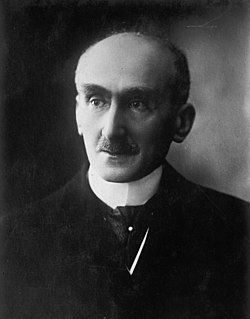Henri Bergson Quote
Creation signifies, above all, emotion, and that not in literature or art alone. We all know the concentration and effort implied in scientific discovery. Genius has been defined as an infinite capacity for taking pains.
Henri Bergson
Creation signifies, above all, emotion, and that not in literature or art alone. We all know the concentration and effort implied in scientific discovery. Genius has been defined as an infinite capacity for taking pains.
Related Quotes
I want to think about trees. Trees have a curious relationship to the subject of the present moment. There are many created things in the universe that outlive us, that outlive the sun, even, but I ca...
Annie Dillard
Tags:
beauty, belief, consciousness, creation, curiosity, disbelief, energy, enoughness, epiphany, exploration
About Henri Bergson
Henri-Louis Bergson (; French: [bɛʁksɔn]; 18 October 1859 – 4 January 1941) was a French philosopher who was influential in the traditions of analytic philosophy and continental philosophy, especially during the first half of the 20th century until the Second World War, but also after 1966 when Gilles Deleuze published Le Bergsonisme. Bergson is known for his arguments that processes of immediate experience and intuition are more significant than abstract rationalism and science for understanding reality.
Bergson was awarded the 1927 Nobel Prize in Literature "in recognition of his rich and vitalizing ideas and the brilliant skill with which they have been presented". In 1930, France awarded him its highest honour, the Grand-Croix de la Legion d'honneur. Bergson's great popularity created a controversy in France, where his views were seen as opposing the secular and scientific attitude adopted by the Republic's officials.
Bergson was awarded the 1927 Nobel Prize in Literature "in recognition of his rich and vitalizing ideas and the brilliant skill with which they have been presented". In 1930, France awarded him its highest honour, the Grand-Croix de la Legion d'honneur. Bergson's great popularity created a controversy in France, where his views were seen as opposing the secular and scientific attitude adopted by the Republic's officials.
